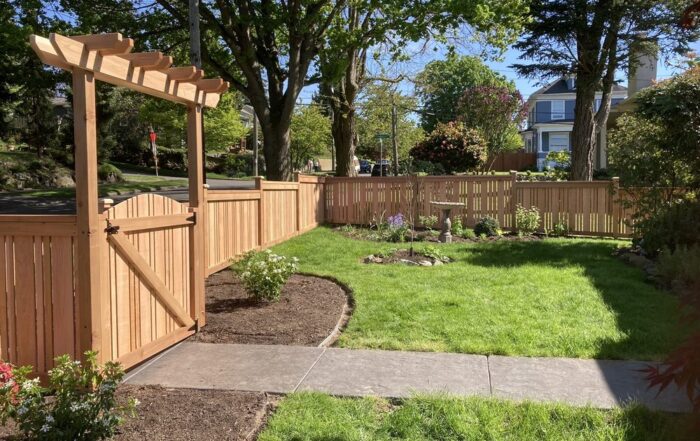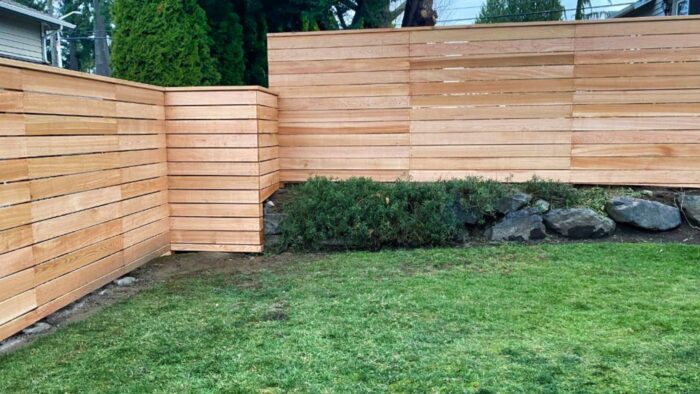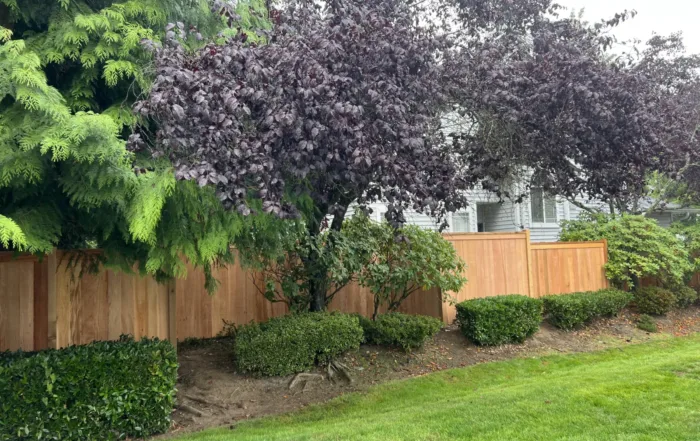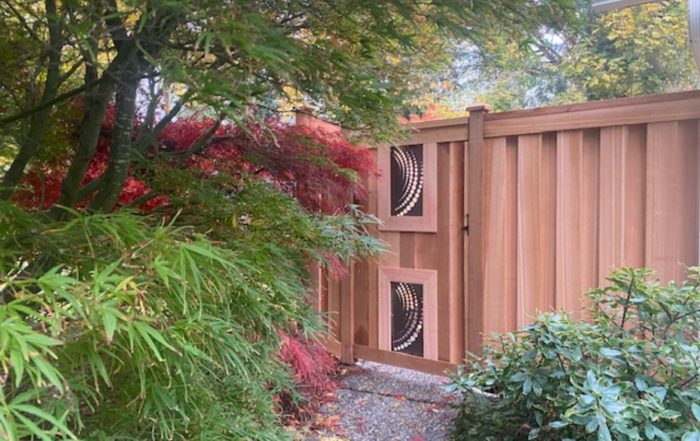Welcome to our guide on understanding Washington fence laws! If you’re a homeowner in the beautiful state of Washington, you may be considering installing a fence on your property. It’s essential to familiarize yourself with the laws and regulations surrounding fence installation to ensure a smooth process and avoid any legal complications. In this article, we’ll provide you with all the information you need to know about Washington fence laws, including height restrictions, placement requirements, permits, maintenance, and more.
What is the Definition of a Lawful Fence in Washington?
In Washington state, a fence is considered lawful if it meets specific requirements outlined in Section 16.60.010. The fence must have at least four barbed, horizontal wires that are well-stretched and spaced properly. The top wire must be 48 inches, with the other wires spaced at 12, 22, and 32 inches. The wires must be securely attached to sturdy posts that are spaced out evenly, but no more than 24 feet apart. If the posts are more than 16 feet apart, stays must be used to support the wires, placed no more than 8 feet from each other or the posts.
No need to worry if your fence doesn’t fit the requirements mentioned earlier. There are other lawful fences stated in Section 16.60.011, but they must be equally strong and well-planned as the fence described in RCW 16.60.010. An inspector can help make this determination.
Understanding Property Boundaries
In Washington State, understanding property boundaries is essential before installing any fence. Precise measurements of your land, together with understanding where your property ends and your neighbor’s begins, are crucial steps. It’s recommended to obtain a professional land survey to confirm your property boundaries.
Compliance with Local Zoning Ordinances
In Washington, local zoning ordinances dictate the rules around fence installation. These ordinances vary by county and city. Therefore, it’s critical to check with your local zoning department to ensure compliance with all rules and regulations. Some common zoning considerations include fence height, material, and location.
Resources:
Chapter 16.60 of the Revised Code of Washington outlines regulations and permit requirements governing fences in Washington state, including definitions and rules.
Snohomish County Planning and Development Services
King County: Fences – Building Permit Regulations
Fence Placement
In addition to height restrictions, there are also placement requirements for fences in Washington. Fences cannot be installed on public property, such as sidewalks or roads. They also cannot obstruct the view of drivers or pedestrians. Fences must be installed on the property line, and homeowners must obtain permission from their neighbors before installing a fence.
Fence Material Regulations
Washington State law does not specify fence materials, but local zoning ordinances may have stipulations. Check with your local building department to confirm if there are any restrictions on the types of materials you can use for your fence.
Fence Height Restrictions
Fence height restrictions in Washington are dependent on the fence’s location on your property. Front yard fences are typically limited to four feet, while back and side yard fences may be up to six feet. However, these are general guidelines, and actual restrictions may vary by location. Please consult your local zoning ordinance for accurate information.
Fence Maintenance Responsibilities
In Washington State, fence maintenance responsibilities are typically shared between neighbors. This includes repairing any damage and routine upkeep to ensure the fence remains in good condition. However, if a fence is entirely within your property boundaries, you will be solely responsible for its maintenance.
Encroachment Laws and Dispute Resolution
In Washington, encroachment laws help protect property owners when a neighbor’s fence crosses into their property. If a dispute arises, it’s recommended to address it directly with your neighbor first. If this doesn’t resolve the issue, consider mediation or legal action.
Permits for Fence Installation
In Washington, you may need a permit for fence installation. Permit requirements vary by county and city, so it’s essential to contact your local building department to determine if you need a permit.
What Kind of Fence is Required for a Residential Pool in Washington?
If you own a pool in Washington, safety is a top priority. To meet the safety regulations, your residential pool fence must be at least 48 inches high, self-latching, self-closing, and fully enclose the pool. The latch should also be out of reach of children.
When it comes to choosing a fence, you want something strong and durable. A white vinyl privacy fence is an ideal choice. It’s waterproof, won’t fade or turn yellow easily, and can easily prevent safety hazards. So sit back, relax, and enjoy your pool knowing it’s safely enclosed.
To Fence-In or Fence-Out: What are the legal responsibilities for livestock?
If you own livestock in Washington, it’s important to know whether it’s a fence-in or fence-out state. A fence-in state means that you are responsible for containing your livestock and will be liable for any damages they cause on someone else’s property. In contrast, a fence-out state means that property owners are responsible for fencing out wandering animals.
Washington is a fence-in state, which means that if your livestock damage someone’s property or cause injury, you will be held responsible. But, if you have a lawful fence and a roaming animal damages it or your property, you can seek reimbursement. Stay informed to protect yourself and your livestock.
Are Dog Owners Required by Washington Law to Install Fences?
Chapter 16.60 RCW titled “Fences,” defines what constitutes a lawful fence and explains that a person who maintains a fence around their enclosure can recover damages from the owners of any animal that breaks through it [1]. This suggests that while having a fence can provide a legal safeguard against potential damages, it is not explicitly required for dog owners.
On the other hand, Chapter 16.08, which discusses regulations related to dogs, does not explicitly require dog owners to fence their properties [2]. It includes regulations related to dog bites, liability for injuries caused by dogs, and rules about dangerous dogs, among others.
It’s important to note that local ordinances may have additional regulations, and depending on those, dog owners may need to confine their dogs or keep them under control. The absence of a state-level mandate to install fences doesn’t exempt dog owners from potential local obligations.
Homeowners are encouraged to install a pet-friendly fence as a preventative measure to avoid possible issues like a dog escaping and causing harm or damage. Different breeds and sizes of dogs each have unique needs, which means they may require different styles of fencing to keep them safe and secure. Large breeds often need taller, sturdy fences to prevent jumping or breakthroughs, while medium-sized dogs may require secure, mid-height fences. Small breeds, on the other hand, need fences with narrow gaps to prevent them from squeezing through.
Conclusion
In conclusion, understanding and complying with Washington fence laws is a vital aspect of installing a fence on your property. These laws encompass a range of factors from fence height, material, and placement, to maintenance responsibilities and even dispute resolution. Remember, if you’re installing a fence, consider consulting a professional inspector or surveyor to ensure compliance and accuracy. Furthermore, always check with your local zoning department for any specific regulations they might have in place.
For homeowners with pools, prioritize safety by adhering to pool fence requirements, such as a minimum height of 48 inches and self-latching gates. If you own livestock, remember that Washington is a fence-in state, making you liable for any damage your animals might cause. So, be proactive and secure them appropriately.
This guide should serve as a comprehensive resource for understanding Washington fence laws, but always check the latest regulations in your local area or seek professional advice if in doubt. Installing a fence can be a substantial investment, so it’s well worth the effort to ensure it’s done correctly, legally, and to the benefit of all involved.
Remember, a good fence makes good neighbors, and understanding these laws ensures you maintain not only a physical boundary but also a harmonious relationship with those living next to you. So, whether you’re looking for some extra privacy, marking your territory, or ensuring the safety of your pool or livestock, knowing the rules will help make your fencing project a successful one.
FAQs
Do I need a permit to install a fence in Washington?
A permit is required for fence installation if the fence exceeds six feet in height or if it is located near a steep slope or waterway. Homeowners should also check with their local zoning authority to see if there are any additional permit requirements in their area.
What are the height restrictions for fences in Washington?
Fences cannot exceed six feet in height in most areas of Washington. However, some areas may have different height restrictions, and it’s essential to check with your local zoning authority before installing a fence.
Can I install a fence on public property in Washington?
No, fences cannot be installed on public property, such as sidewalks or roads.
What if a neighbor’s fence crosses into my property?
Washington has encroachment laws to protect property owners in these situations. It’s recommended to address the issue directly with your neighbor first. If that doesn’t resolve the issue, consider mediation or legal action.
Can my neighbor stop me from installing a fence?
Homeowners must obtain permission from their neighbors before installing a fence. If a neighbor objects to the installation, a compromise may need to be reached through mediation or legal action.
What should I do if my fence is in disrepair?
Homeowners are responsible for maintaining their fences to ensure they are in good condition and do not pose a hazard to their neighbors. Fences that are in disrepair should be repaired or replaced promptly to avoid legal issues and potential fines.




